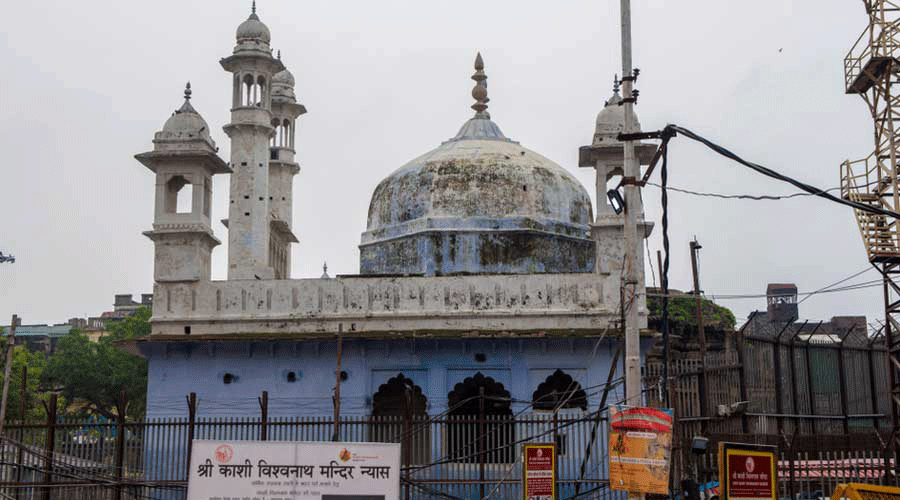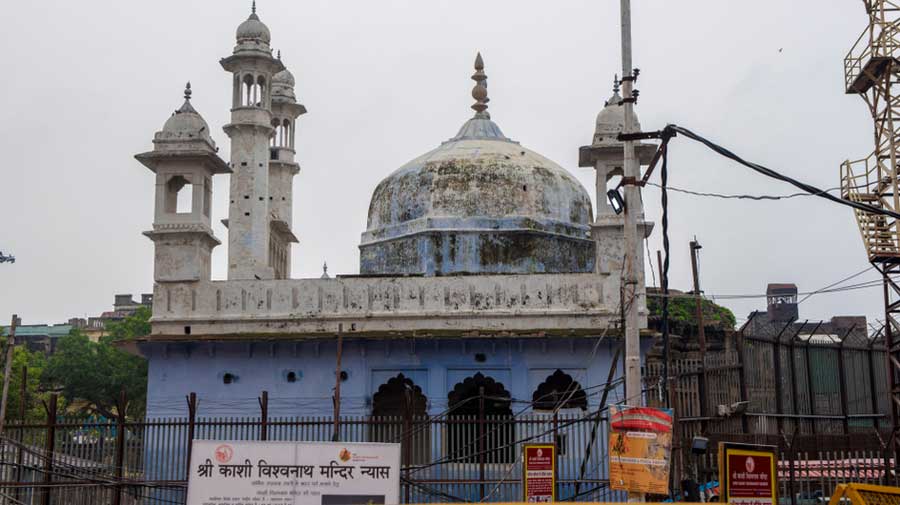A two-day-old survey on the Gyanvapi mosque premises by a civil-court-appointed commission in Varanasi has triggered controversy, with the panel’s Hindu members accused of overstepping their brief to look for a temple’s ruins and local Muslims charged with resisting the exercise.
The issue is sensitive since the mosque is the subject of a Sangh parivar campaign — similar to the Ayodhya temple movement — that claims it was built after demolishing a part of the original Kashi Vishwanath temple and should be removed.
On Saturday, civil judge Ravi Kumar Diwakar rejected the mosque management’s plea to change the panel’s head, whom it had accused of bias. Subsequently, the Muslim side was accused of blocking the survey.
Judge Diwakar is dealing with a plea from six Hindus for permission to pray every day at the Shringar Gauri, a raised brick-and-mortar platform on the mosque premises with engraved figurines that some Hindus claim are images of gods and goddesses.
The petitioners also want protection for figures carved on the boundary wall that the Gyanvapi shares with the Kashi Vishwanath.
On April 9, the judge formed a fact-finding commission of 18 Hindus and 18 Muslims — including the six petitioners and eight of their lawyers, six mosque committee members and eight of their lawyers, and eight independent lawyers, four of them Hindu and four Muslim. It sought the survey report and supporting videos on May 10.
However, after the survey began on Friday, the mosque management accused the panel head or “advocate commissioner”, independent lawyer Ajay Kumar Mishra, of bias and approached the court on Saturday morning seeking his removal.
Mosque committee members and their lawyers have told reporters that the commission was seeking to survey the mosque’s walls and underground storeroom, apparently to establish the Sangh theory of a temple’s ruins lying underneath.
Several cases relating to the temple dispute are pending in various courts. Another civil judge in Varanasi had in April last year ordered an archaeological survey of the mosque’s premises and immediate neighbourhood to establish whether a temple existed under it, but Allahabad High Court stayed it in October.
On Saturday, Judge Diwakar dismissed the mosque committee’s plea at 3pm, asking the commission to resume its videography and survey.
However, Hari Shankar Jain, counsel for the Hindu side, later said this could not be done because all the 12 Muslim lawyers on the panel had resigned and local Muslims resisted the remaining members’ entry.
“We will present our side in the court on Monday,” Jain said.
Raees Ahmad Ansari, a lawyer for the mosque committee, confirmed the resignations, saying: “We were unhappy with the way the advocate commissioner and his team members were touching the walls and other structures on the mosque premises on Friday. They were seen scratching the walls to see if there were any figurines carved on them.”
He added: “On Saturday, they tried to enter the main mosque premises and wanted to see the locked mattamore (underground store). They are going beyond their brief — the court wants a report only on the present status of the Shringar Gauri.”
Shivam Gaur, one of the Hindu lawyers, claimed: “The court wants a survey report on the entire mosque premises.”
He said the team expected to find “remains of a temple and past religious activities in the locked underground room” and asserted that this would throw light on the Kashi Vishwanath-Gyanvapi controversy.
An independent Hindu lawyer said the exact task set for the commission by the court was unclear and that the point would probably be cleared up on Monday.
Residents in the neighbourhood told this newspaper that a large number of slogan-shouting Hindus and Muslims had gathered on opposite sides of the mosque around the time commission members arrived late on Saturday afternoon to try and resume the survey.
A man named Abdul Kalam was taken into custody for alleged incitement, a local journalist who didn’t want to be named said.
Varanasi city police commissioner A. Satish Ganesh said: “Everything is going on peacefully except a few minor incidents. We are committed to ensuring that the court’s order is followed.”
The petitioners say Hindus were allowed to pray at the Shringar Gauri every day till the Babri Masjid demolition of December 6, 1992. After a gap of three years, the Uttar Pradesh government in 1995 allowed Hindus to worship at the place once a year, on the fourth day of Chaitra Navratri.












